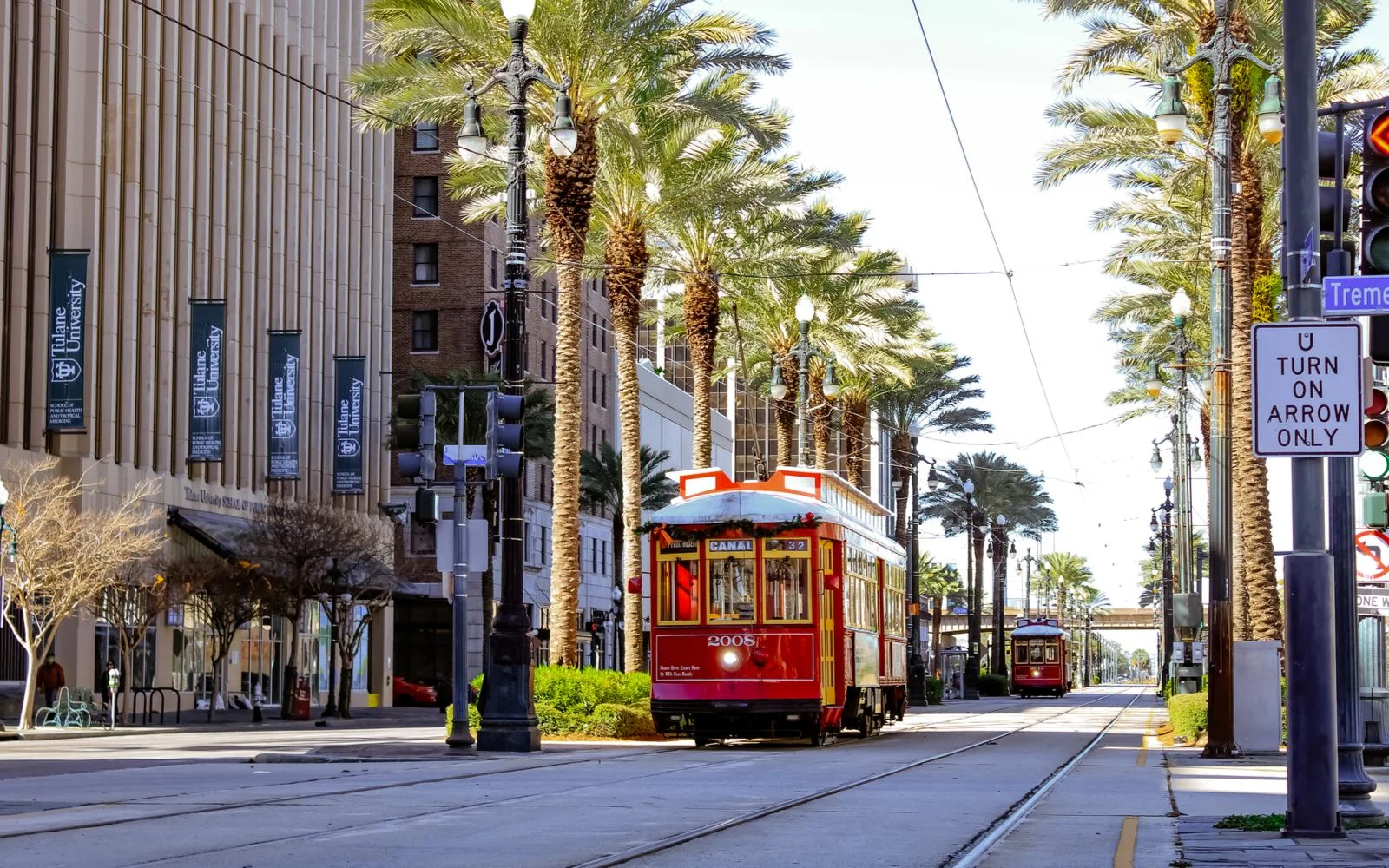Is New Orleans safe to visit in 2025?
Yes, New Orleans is generally safe to visit, but travelers should exercise caution and remain aware of their surroundings. The city does have a high crime rate, particularly in certain neighborhoods, but most crimes do not typically target tourists, especially in popular areas like the French Quarter.
The beautiful, hedonistic city of New Orleans is a popular destination for national and international visitors in the United States. Nearly 19 million visitors come to the city annually.
New Orleans’ unique culture and history, a legacy of the decades it was under French occupation, are the reason why so many people visit. You can see traces of this history in the elegant French Quarter, which feels like a European city, not a North American one.
People also visit New Orleans thanks to its lively musical scene, found in the many jazz and blues bars, and its stunning nightlife. The nightlife gets even better during Mardi Gras, one big street party that takes over the city.
But while this storied city is rich in history, culture, and nightlife, is New Orleans safe to visit? Here’s our expert take.
Is New Orleans Safe to Visit?
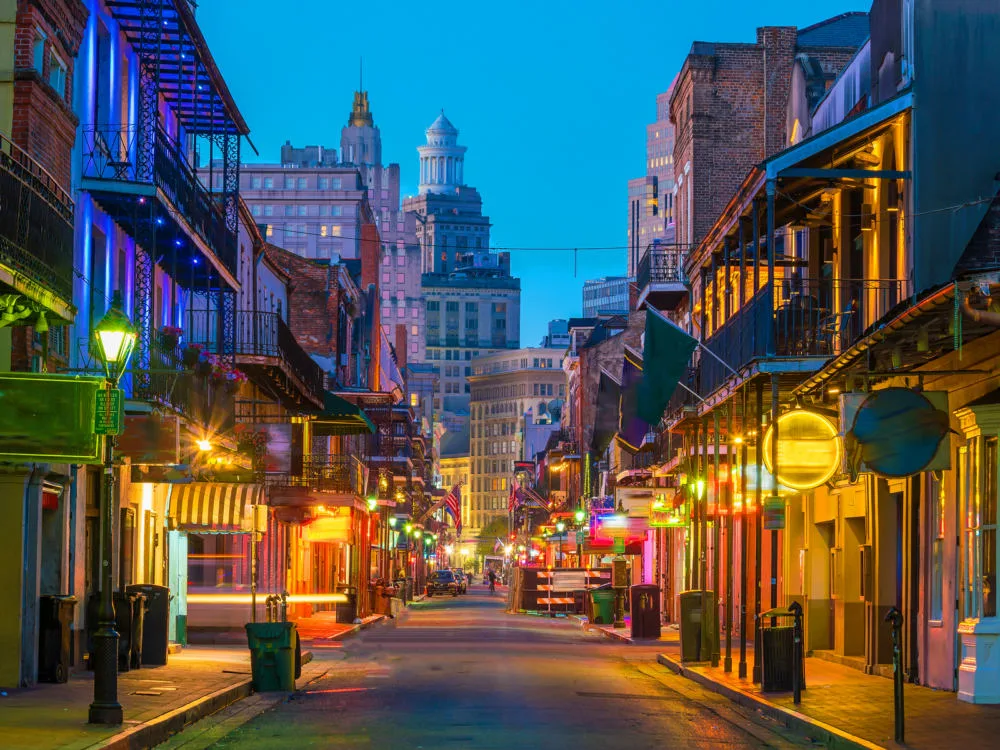
f11photo/Shutterstock
Yes. New Orleans is safe to visit, but visitors need to take basic precautions and be aware of their surroundings.
New Orleans has a high crime rate, including a high violent crime rate. Although crime doesn’t usually affect tourists as it is confined to parts of New Orleans where tourists rarely venture, visitors should still take basic precautions to protect themselves.
There is no way to sugarcoat the situation in the city. New Orleans has one of the highest crime rates in the country. More troubling, it has one of the highest violent crime rates in the United States. According to local news, the city has the 9th highest homicide rate in the United States.
Other common crimes in New Orleans include:
- Assault
- Robbery
- Carjacking
- Scams
- Petty theft
With such worrying crime statistics, you may be wondering why people visit New Orleans at all! However, most victims of these crimes are locals, not tourists.
The vast majority of crime occurs in residential neighborhoods that are far away from places where tourists tend to visit. Popular neighborhoods such as the French Quarter are relatively safe, especially from violent crime.
The New Orleans tourist board shares information about the investments the city has made in keeping the popular tourist areas safe, such as increased NOPD presence and the implementation of public safety rangers to provide an additional pair of eyes on busy streets.
Besides crime, you have to worry about the weather in New Orleans. The city is extremely vulnerable to hurricanes, which anyone who remembers the devastation of Hurricane Katrina will know.
Although there hasn’t been a storm like Hurricane Katrina since, New Orleans still gets hit hard by hurricane season each year, especially since much of the city is below sea level. Every few years, it experiences another deadly storm, such as Hurricane Ida in 2021.
For safety reasons, it’s best to avoid New Orleans during hurricane season. Even if there isn’t deadly flooding, walking around the city during a hurricane is unpleasant. Hurricane season lasts from June to November but is the worst in August and September.
Ready to Book?
Unlock Exclusive Discounts on Expedia.com!
Got Travel Insurance?
Protect yourself for unexpected interruptions.
Compare Plans We may be compensated when you book after clicking on one of our links.Crime in New Orleans
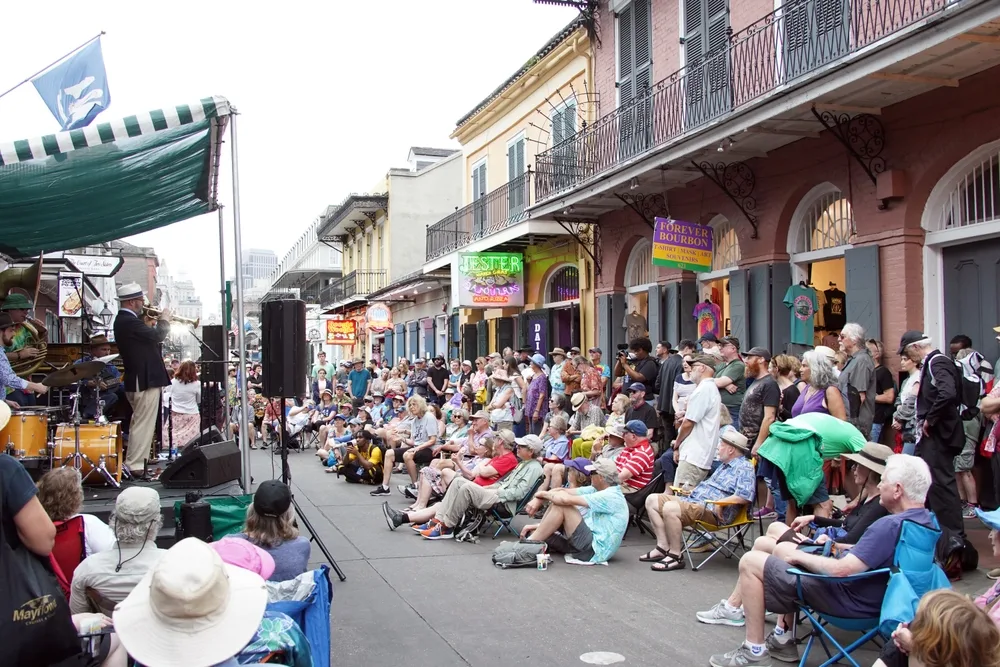
New Orleans, LA – April 9, 2023: A crowd gathers on Bourbon Street in the historic French Quarter in New Orleans, Louisiana for a traditional jazz band/Adam McCullough/Shutterstock
Crime is the biggest challenge for visitors and residents of New Orleans alike. The city struggles with a high crime rate and high violent crime rate.
Most worrying is the high homicide rate, which is a whopping 41 incidents per 100,000 residents, much higher than the rate in other major cities such as Chicago. There are a few factors behind New Orleans’s high homicide rate, including deep-standing social inequality, some of the worst poverty rates in the nation, a high gun-ownership rate, and a poorly staffed police force often accused of corruption.
Homicides make up 0.4% of the overall crime rate in New Orleans, and 26% of the total violent crimes committed in the city, according to FBI data. Violent crime makes up about 17.7% of total crimes committed in the city. The most common violent crime is robbery, which makes up 57.7% of all violent crimes committed in the city.
Although violent crimes grab the headlines, property crimes make up most crimes committed in New Orleans, about 82.3%. As in most other places, the most common property crime is larceny-theft, which makes up about 75.6% of property crimes committed in New Orleans. New Orleans also has a high rate of car theft.
However, it’s important to put crime statistics for New Orleans in context. The crime rate in Louisiana (and the American South as a whole) is fairly high, and New Orleans’s crime rate is actually declining compared to the rest of the state.
The crime rate in New Orleans has also been declining in recent years. Violent crime dropped by a whopping 20% in New Orleans, while it was rising in the rest of the country and the rest of the state of Louisiana. The decline in crime comes as a result of years of efforts by local law enforcement and civil society advocates.
All these crime statistics paint a picture of safety in New Orleans that is both grim and optimistic. It is true that the city has a lot of crime, and visitors could be affected by it. You will have to take several precautions to stay safe, including not wandering in unfamiliar areas and staying aware of your surroundings.
However, that doesn’t mean that New Orleans is completely dangerous to visit, and many locals resent this stereotype of their city. Bad things happen in New Orleans, like in many other places, but the reasons are more complex than they seem at first glance. Taking the right precautions to ensure you explore this beautiful city safely is worth it.
Petty Theft
The most common crime people, especially tourists, experience in New Orleans is petty theft. The city has a fairly high rate of petty theft such as pickpocketing, bag snatching, and theft from vehicles.
The rate of petty theft is highest in touristy areas of town, such as the French Quarter and Bourbon Street. The area between Bourbon Street and Frenchman Street is a hot spot for crime. Tourists are often targeted for theft and scams.
The New Orleans tourism board has a list of tips for visitors to avoid being victims of theft. Take basic precautions to protect yourself, such as:
- At night, walk with groups or take a taxi.
- Avoid getting too intoxicated as thieves target people in or outside bars and clubs.
- Be careful when using your smartphone in public because phone thefts are common.
- Put your wallet in a safe place, such as a front pocket or cross-body bag.
- Never leave your bag unattended or somewhere where it is easy to grab, such as the back of a café chair.
- Trust your instincts—if a situation feels suspicious, leave.
Scammers frequently approach tourists and take their money. Some of the scams are typical to New Orleans and play on the city’s reputation for fortune telling and voodoo to scam people. Scammers approach people and offer to tell their fortune—a common line is offering to tell you where you got your shoes.
Other scams are common elsewhere, such as card games, corn games, and rappers approaching people in the street with CDs or personalized songs. Others use the famous Mardi Gras beads to scam people, by offering people bead necklaces then demanding payment.
Treat scammers in New Orleans the same way you would treat them elsewhere. If someone approaches you in the street or seems way too eager to talk to you, walk away and ignore them. If they harass you, hail a police officer or Public Safety Ranger.
Robbery
The violent crime that tourists are most at risk of in New Orleans, and also the most common violent crime in the city, is robbery. Robberies can happen in tourist areas of the city, and tourists are often targeted especially along the popular nightlife street of Bourbon Street.
The good news is that robberies often happen at night and are relatively easy to avoid if you take the right precautions. Avoid walking around alone at night. Only travel with a group in well-lit pedestrian areas with plenty of other people around. In more secluded areas after dark, opt for a taxi or an Uber, even if you are with other people.
You also don’t want to draw attention to yourself as a potential victim or do something that makes you attractive to potential robbers. Avoid flashing lots of cash or valuables that single you out as a lucrative target.
Although many people come to New Orleans for the nightlife, avoid overindulging as robbers often target people that are too inebriated. Some robbers operate in clubs and bars and single out people to target. Always keep a close eye on your drink to make sure someone doesn’t slip something in your drink.
Avoiding Bad Areas
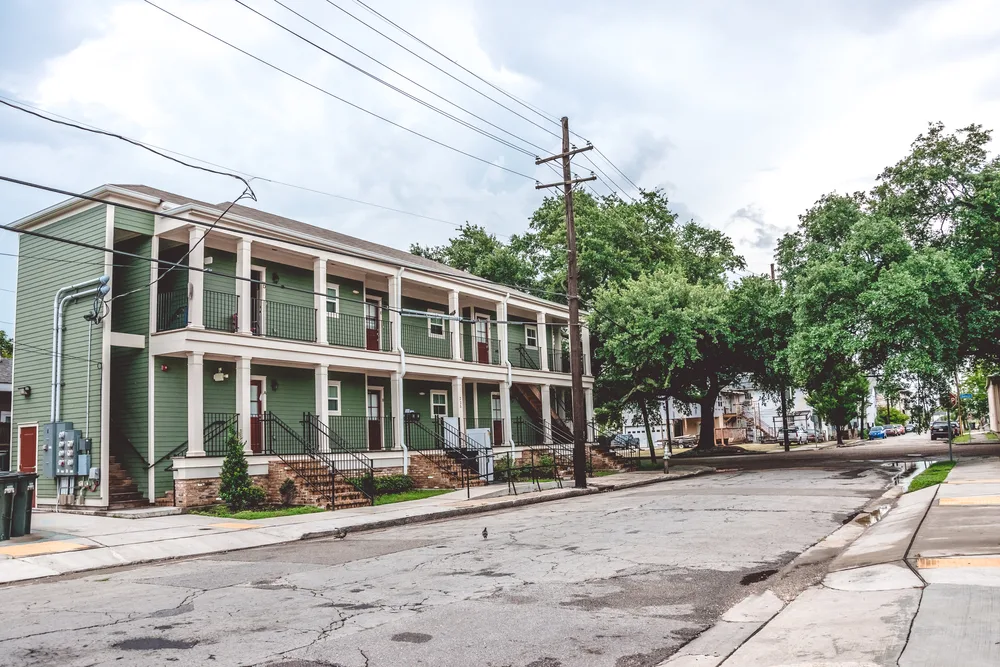
New Orleans, Louisiana / USA – June 24 2017: Life in the old poor neighborhood of New Orleans. Old wooden houses in colonial style/Konoplytska/Shutterstock
Staying safe in New Orleans means avoiding neighborhoods with a dangerous reputation. Crime in New Orleans is very stratified by location, and neighborhoods outside of the tourist core tend to have much higher crime rates. These neighborhoods are usually impoverished and marginalized by the city—and are rarely places where tourists will venture, even accidentally.
Still, it’s good to know which places in the city are best avoided. The most dangerous neighborhoods in New Orleans are Desire and Florida, but they are far away from popular tourist routes.
Other neighborhoods to avoid include:
- Central City (outside of Oretha Castle Haley Boulevard)
- Hoffman Triangle
- Zion City
- Touro
Ask a local for more precise advice while you are in town.
Frequently Asked Questions
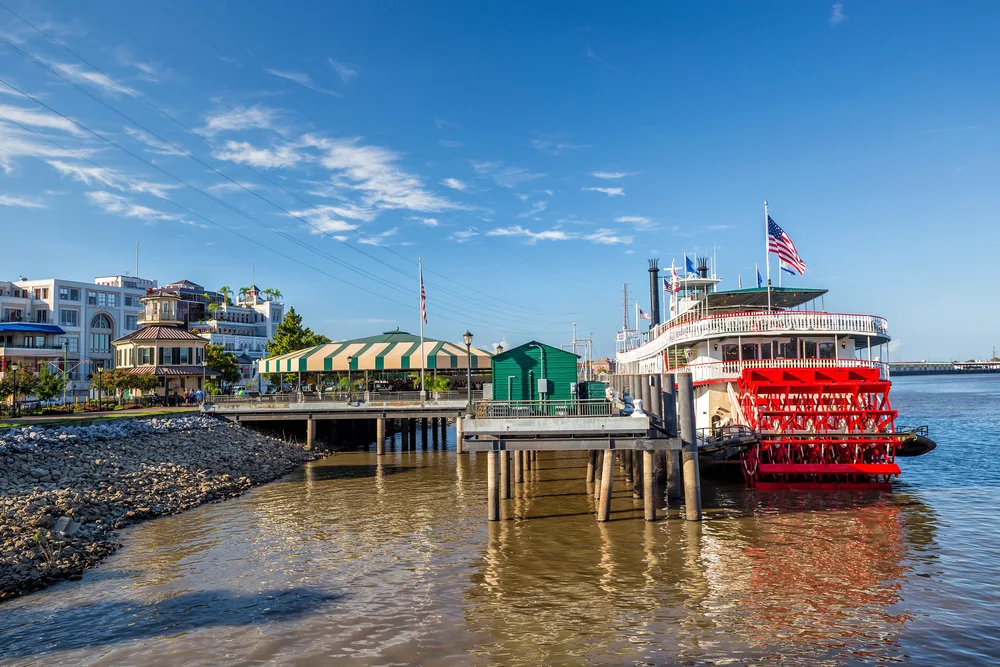
f11photo/Shutterstock
Here are some of the most commonly asked questions by visitors to New Orleans:
Is New Orleans safe as a tourist?
As a tourist, you will be safe in New Orleans — otherwise, it wouldn’t still attract millions of visitors! The areas in New Orleans that are popular among tourists also have the lowest crime rates.
Is it safe to walk in New Orleans at night?
New Orleans isn’t very safe at night since the crime rate is so high. The only place that is somewhat safe at night is the French Quarter (and even then, only the main streets), because there is so much foot traffic that criminals are deterred.
Is New Orleans still worth visiting?
Despite the challenges, New Orleans is still worth visiting. It is a beautiful city and has a rich culture completely unique not just in the United States, but in the world as well.
Is New Orleans expensive to visit?
The main tourist areas in New Orleans, such as Bourbon Street, can be a bit pricey. However, it is possible to visit the city on a budget.
Is Uber safe in New Orleans?
Uber is safe in New Orleans, and one of the safest ways to get around the city at night. Make sure you still take safety precautions, such as checking the license plates and name of the driver who comes to pick you up, because criminals will sometimes pose as Uber drivers.
So, Is New Orleans Safe to Visit?
New Orleans is a city where you will have to take some precautions, including making sure that you stick to well-trafficked, safe parts of the city. If you do that, you will have a safe trip.



